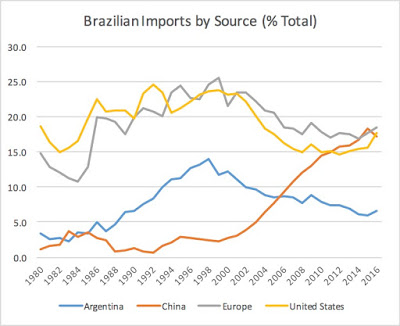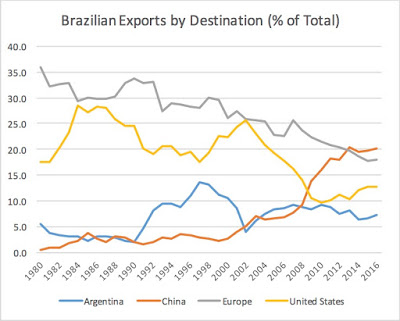I have discussed here the role of Chinese growth in the decrease of US manufacturing jobs (note that I was, and still am somewhat critical about simplistic stories of deindustrialization). At any rate, for other reasons I was looking at the IMF Direction of Trade Statistics (DOTS) and ended up with the two graphs below. After the Chinese entry in the WTO in 2001 the rise in Brazilian imports is astounding. Now Chinese imports of manufacturing goods are about the same share as imports from the US and the European Union. Brazilian exports to China, on the other hand, only take off after the Global Crisis in 2008, even though an increase after 2001 is also visible. This suggests that, in spite of the slowdown in China, their relatively rapid growth has sustained the external markets
Topics:
Matias Vernengo considers the following as important: Brazil, China, Deindustrialization, WTO
This could be interesting, too:
Matias Vernengo writes The behavior of the nominal exchange rate between the Brazilian Real and the dollar in 2024
Matias Vernengo writes Serrano, Summa and Marins on Inflation, and Monetary Policy
Dean Baker writes Donald Trump is badly nonfused # 67,218: The story of supply and demand
Matias Vernengo writes Very brief note on the Brazilian real and the fiscal package
After the Chinese entry in the WTO in 2001 the rise in Brazilian imports is astounding. Now Chinese imports of manufacturing goods are about the same share as imports from the US and the European Union.
Brazilian exports to China, on the other hand, only take off after the Global Crisis in 2008, even though an increase after 2001 is also visible. This suggests that, in spite of the slowdown in China, their relatively rapid growth has sustained the external markets for Brazilian commodities (iron ore and soybeans mostly). There is a lot to be said about the patterns of specialization that this South-South integration has shaped, and the problems that it entails for Brazil and other Latin American economies, of course. But that's for another post.
There will be a lot of postmortems for the European Union (EU) after Brexit. Many will suggest that this was a victory against the neoliberal policies of the European Union. See, for example, the first three paragraphs of Paul Mason's column here. And it is true, large contingents of working class people, that have suffered with 'free-market' economics, voted for leaving the union. The union, rightly or wrongly, has been seen as undemocratic and responsible for the economics woes of Europe.
The problem is that while it is true that the EU leaders have been part of the problem and have pursued the neoliberal policies within the framework of the union, sometimes with treaties like the Fiscal Compact, it is far from clear that Brexit and the possible demise of the union, if the fever spreads to France, Germany and other countries with their populations demanding their own referenda, will lead to the abandonment of neoliberal policies. Aust…
The economy in Venezuela has collapsed (GDP has fallen by about 14% or so in the last two years), inflation has accelerated (to three digit levels; 450% or so according to the IMF), there are shortages of essential goods, recurrent energy blackouts, and all of these aggravated by persistent violence. Contrary to what the press suggests, these events are not new or specific to left of center governments. Similar events occurred in the late 1980s, in the infamous Caracazo, when the fall in oil prices caused an external crisis, inflation, and food shortages, which eventually, after the announcement of a neoliberal economic package that included the i…


